
Singanalluru Puttaswamaiah Muthuraj, better known by his stage name Dr. Rajkumar, was an Indian actor and singer who worked in Kannada cinema. Regarded as one of the greatest and versatile actors in the history of Indian cinema, he is considered a cultural icon and holds a matinée idol status in the Kannada diaspora, among whom he is popularly called as Nata Saarvabhouma, Bangarada Manushya, Vara Nata, Gaana Gandharva, Rasikara Raja, Kannada Kanteerava and Rajanna/Annavru. He was honoured with Padma Bhushan in 1983 and Dadasaheb Phalke Award in 1995. He is the only lead actor to win National Award for Playback singing. His 39 movies have been remade 63 times in 9 languages by 34 actors making him the first actor whose movies were remade more than fifty times and the first actor whose movies were remade in nine languages. He was the first actor in India to enact a role which was based on James Bond in a full-fledged manner. The success of his movie Jedara Bale is credited to have widely inspired a Desi bond genre in other Indian film industries. On the occasion of the "Centenary of Indian Cinema" in April 2013, Forbes included his performance in Bangaarada Manushya on its list of "25 Greatest Acting Performances of Indian Cinema". Upon his death, The New York Times had described him as one of India's most popular movie stars.
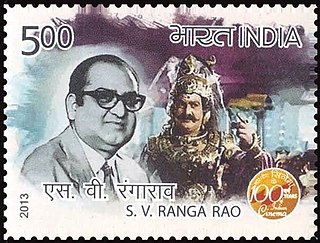
Samarla Venkata Ranga Rao, popularly known as SVR, was an Indian actor and filmmaker known for his works majorly in Telugu and Tamil films. He is regarded as one of the finest actors in the history of Indian cinema. He is known by the epithet "Viswa Nata Chakravarthi". He was the earliest known character actor to have enjoyed a star status in South Indian cinema. In a career spanning nearly three decades, Ranga Rao garnered various national and international honours.

Babukodi Venkataramana Karanth widely known as B. V. Karanth was an Indian film director, playwright, actor, screenwriter, composer, and dramatist known for his works in the Kannada theatre, Kannada cinema, and Hindi cinema. One of the pioneers of the Parallel Cinema, Karanth was an alumnus of the National School of Drama (1962) and later, its Director. He received the Sangeet Natak Akademi Award (1976), six National Film Awards, and the civilian honor Padma Shri for his contributions towards the field of art.

Manchu Bhakthavatsalam Naidu, credited and also known as Mohan Babu, is an Indian actor and producer known for his works predominantly in Telugu cinema. An alumnus of the Madras Film Institute, Mohan Babu has acted in more than 500 films in lead, supporting and a variety of roles.
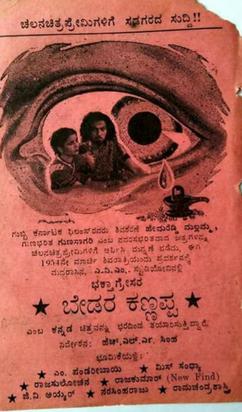
Bedara Kannappa is a 1954 Indian Kannada-language Hindu mythological film directed by H. L. N. Simha and written by G. V. Iyer. The film stars Rajkumar playing the title character along with Pandari Bai, Kushala Kumari, G. V. Iyer, Sandhya and Narasimharaju in other prominent roles. The film is an adaptation of the stage play Kaalahasti Charitre written by T. N. Balakrishna for the Gubbi Veeranna Nataka Company, which was based on the folk tale of the hunter Kannappa who proves his extreme devotion to the Hindu God Shiva by gouging out both his eyes.
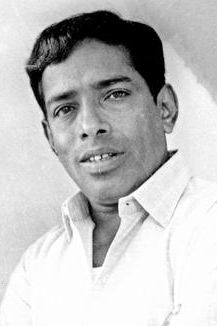
Tiptur Ramaraju Narasimharaju was an Indian Famous legendary actor in Kannada cinema who specialised in roles that required ample comic timing. He was the comedy stalwart of the Kannada film industry. He acted in more than 250 Kannada films between 1954 and 1979. He was also referred to as Hasya Chakravarti.

Gubbi Hampanna Veeranna was an Indian theatre director. He was one of the pioneers and most prolific contributors to Kannada theatre. He established the drama company, Gubbi Sree Channabasaveshwara Nataka Company, which played a crucial role in promoting the Kannada theatre field. He has been conferred the title Nataka Ratna meaning "A Precious Jewel" in the theatre world. Gubbi Veeranna laid the foundation stone for the Kannada film industry. He established a studio, produced silent films in early days of cinema and produced good Kannada short films, He built theaters and introduced many actors including Dr Rajkumar, G.V Iyer, B.V Karanth, Girish Karnad and others to the Kannada film industry.

Singanalluru Puttaswamaiah Muthuraj, better known by his stage name Dr. Rajkumar, was an Indian actor, singer and producer who worked in Kannada cinema. Through his over five-decade long career of over 200 films, he was regarded one of the most pivotal and influential figures of the Kannada film industry. His films were praised for acting as a bridge between the popular and art films because of the theme of the story and their treatment. He debuted as a child actor in the 1942 Kannada film Bhakta Prahlada. His first role as an adult came in Sri Srinivasa Kalyana (1952) and as a lead, two years later, in Bedara Kannappa, which gave him stardom. He debuted as a singer with the track Om Namaha Shivaya from the 1956 film Ohileshwara. In 1960, he made his debut as a producer by producing Ranadheera Kanteerava. According to Ashish Rajadhyaksha and Paul Willemen in the book Encyclopedia of Indian Cinema, Ranadheera Kanteerava was the first "big hit" in Kannada cinema. In a film career spanning fifty years, Rajkumar received eleven Karnataka State Film Awards, including nine Best Actor and two Best Singer awards, eight Filmfare Awards South, and one National Film Award. Along with Vishnuvardhan and Ambareesh, he is counted in Kannada cinema's "triumvirate" as its most celebrated actor.
Kanteerava Studios was planned and allotted for the development of Kannada Films.
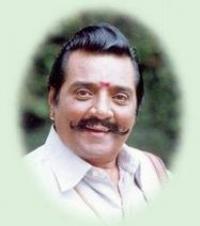
Gopal Rao, known by his stage name Dheerendra Gopal, was an Indian film and stage actor known for his work in Kannada films. After making his film debut with Subhadra Kalyana (1972), he received recognition for his performance in Puttanna Kanagal's Paduvaaralli Pandavaru (1978).
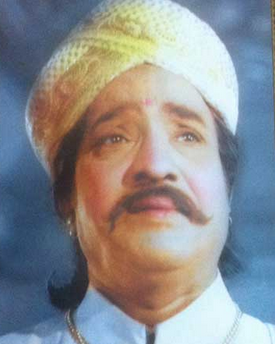
Tirumakudalu Narasipura Balakrishna was an Indian actor in Kannada cinema. He was said to have a hearing problem and some say that he was totally deaf. However, he would catch the lip movements of the artists and would narrate the dialogues spontaneously. He was popular for his comic and villainous roles in films like Kantheredu Nodu (1961), Muriyada Mane (1964), Bangaarada Manushya (1972), Gandhada Gudi (1973) and Kaamana Billu (1983) and appeared in numerous versatile roles over a hundred films that starred Rajkumar in the lead role.
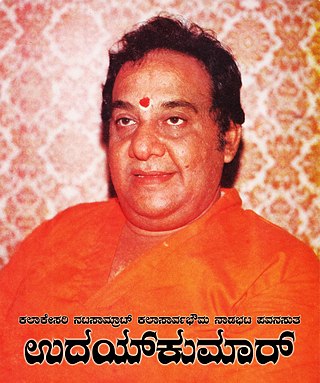
Bommasandra Srinivasaiah Suryanarayana Murthy, known by his screen name Udaykumar, was an Indian actor and producer in Kannada cinema. He, along with Kalyan Kumar and Rajkumar, were called the Kumarathrayaru of Kannada cinema. He has authored many dramas and books. He has performed a broad range of roles and worked with all of the prominent actors of his day. He portrayed heroic characters early in his career later it became more nuanced villainous characters, often counterpointing Rajkumar's heroic persona in historicals and mythologicals.
Gunasagari is a 1953 Indian Kannada-language film directed by H. L. N. Simha and produced by AVM Productions. It stars Gubbi Veeranna, Honnappa Bhagavathar and Pandari Bai. The music was composed by R. Sudarshanam. The film was released in Tamil as Sathya Sodhanai. Malayalam actor Prem Nazir had a small role in this film which was his only Kannada film appearance. Rajasulochana made her debut with this film.
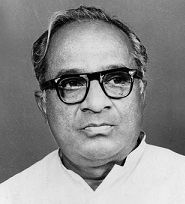
Hunsur Krishnamurthy was an Indian playwright, film director, producer, actor, screenwriter and lyricist in Kannada cinema.

R. Nagarathnamma (1926–2012) was an Indian theatre personality and the founder of Stree Nataka Mandali, an all-women theatre group based in Bengaluru. A recipient of the Sangeet Natak Akademi Award, she was honored by the Government of India, in 2012, with the fourth highest Indian civilian award of Padma Shri.
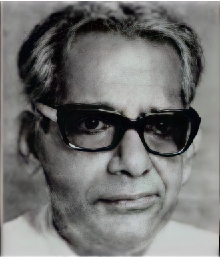
K. R. Seetharama Sastry popularly known as Ku. Ra. Seetharama Sastry or simply Ku. Ra. Si was an Indian actor, writer, lyricist and director in Kannada film industry. After a career in theatre, Sastry's career in films was those of an actor, director, producer, screenwriter, lyricist and an occasional composer. He is considered one of the most influential personalities in the history of Kannada cinema.

Jeevana Nataka is a 1943 Indian Kannada film directed by Wahab Kashmiri, based on a play of the same name written by A. N. Krishna Rao. The film was produced by Gubbi Veeranna, his first as an independent producer. Veeranna also appeared in a lead role in the film alongside debutante Kemparaj Urs, Shanta Hublikar and B. Jayamma.
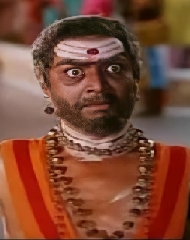
Shivaprakash, known by his screen name Shani Mahadevappa, was an Indian actor who worked in Kannada cinema.
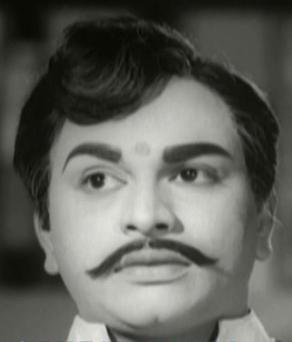
Balasubramaniam (1937–1990), know by his screen name Dinesh, was an Indian actor known for his work in Kannada cinema. Notably, he acted in Bhootayyana Maga Ayyu (1974), Golmaal Radhakrishna (1990), S. P. Sangliyana Part 2 (1990) and Seetharamu (1979).
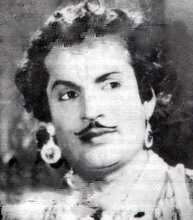
D. Kemaparaj Urs was an Indian freedom fighter, actor, director and producer who worked mainly in the Kannada film industry. His movies in 1940s and 1950s created an impact on the audience. Even before Dr. Rajkumar's arrival to the industry, Urs was already an established star. His elder brother D. Devaraj Urs, served as the Chief Minister of Karnataka.

















